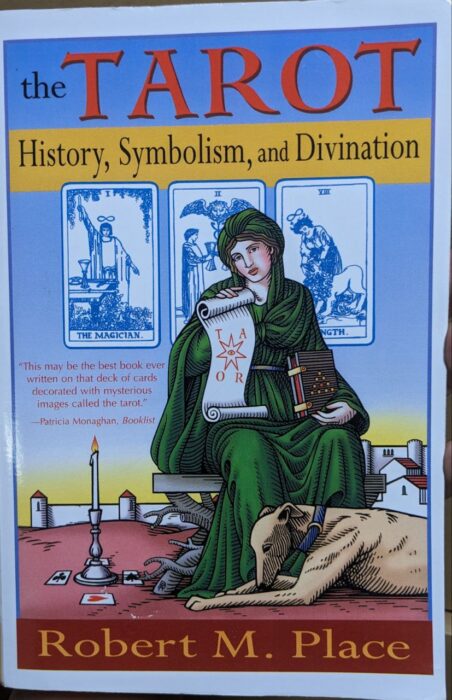“One of my favorite books of all time is a comprehensive guide to Tarot” is not only a pickup line with 100% success rate, it’s also true.
I’ve been into tarot since high school. My first deck was a Marseille Tarot deck that got replaced by a Rider-Waite-Smith deck when the first one was water-damaged. I honestly can’t remember what got me into it, but I know it wasn’t Persona because that one I discovered later (after graduating high school in fact) and all the stuff I learned transferred.
Then again, as I get older the lines of being a “teen” blur so much that I might’ve gotten into it BECAUSE of Persona but the timeframe was really tight.
Cut to over 10 years later in 2021, the first year where I was rediscovering who I was and what it meant to be me, and the idea of getting a Tarot deck came up. This book (alongside MANY others) was recommended by The Algorythm, and it wouldn’t be wrong to say that this book reminded me along the way that Reading is Cool and I should get more books.
The thing about this book is that it’s not merely “here’s a bunch of symbolism for each card”. In fact, it goes into excruciating detail about not only the origins of each arcana but the origins of tarot as a whole. It peels back the layer of mysticism often permeating literature on this matter and the result is that, rather than being dismissive of it, it makes you appreciate it more and uncover why it came to be a specific way.
It’s like reading Journey to the West which makes you understand Dragon Ball which makes you understand any modern combat Shonen manga in the process.
For example, ever since I got into Tarot I was familiar with “The Fool’s Journey”, the idea of the zeroeth arcana progressing through each one to illumination. However, the book explains through its peeling of mysticism that Tarot was effectively a game you played where the arcana were a fifth suit of cards and The Fool was a wild card. Now, anyone that has played Persona will know that term… but also anyone that has played Uno will know it. A Wild Card is just a card that you can play in place of any card you want, a resource that’s definitely more valuable in something like poker where you can complete a Straight Flush with it instead of Uno where it’s just one extra +4 card.
With this context in mind, The Fool is explained not as the one going through the journey, but as a sort of master that can question the person going through the journey at any point of it, as if representing the idea that no matter how far you go through your journey, you can always learn more.
Another example are the explanations about The Hanged Man. Many a symbolism over Odin meditating and such has been made up, but this book taught me there’s a high chance that the card is meant to represent a traitor, since traitors and such have been traditionally hung from the heels in Italy, effectively treating them more like animals in a rack than human (see: Mussolini’s death).
But the book doesn’t seek to discredit all the mystical meanings, rather, it seeks to foster a more personal meaning for the individual. Do you take The Hanged Man to represent Odin hanging from the world tree to gain knowledge? Do you take it to represent a traitor either in the self or sabotaging you? Do you take it to represent the betrayal of the physical as you move into the spiritual?
The ultimate thesis of the book is a very refreshing one, in the fact that Tarot is ultimately a meditation tool. The symbols should hold specific meaning to you or others, and through Tarot use them as a means to look inwards, to facilitate a brainstorming of things that maybe you found hard to start to think about. It’s what Jungian symbols and all that nonsense is ultimately about once you get through the miasma of surface-level mysticism people usually stop at.
I think that was the point where the book sealed the deal for me. I was already enraptured by all the comprehensively quoted elements like the many platonic philosophies, the history of Triumphs and of divination, but then the end of the book drops the academic tone and starts talking about sitting with each card and getting familiar with it, of clearing your mind and thinking what it makes you feel without any other knowledge and then maybe using all the things you’ve learned to fill the gaps.
Because at that point the author reveals his hand (HAH!) about how he isn’t really enforcing one reading or discrediting any school of mysticism you want to attribute to the deck. You can use a novelty deck where every card is a Vtuber, I’ve personally grown fond of a small Alice in Wonderland themed deck I bought.
All the author wants is to avoid complacency in the topic, and that’s something I can get behind any day of the week.
It’s also one hell of a starting point, if you grab every text quoted through its length you’ll end up with one hell of a collection before long.
